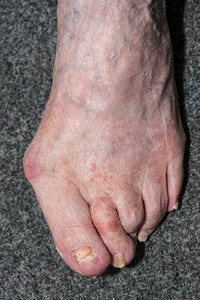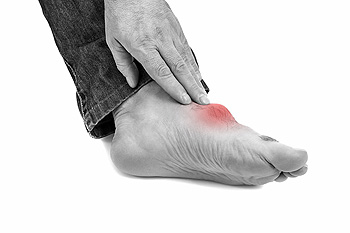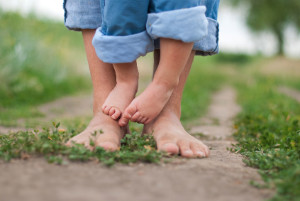 There are many types of deformities that can happen to the feet. One of these is referred to as a hammertoe, which can cause the toe to bend downward instead of naturally pointing forward. It can develop gradually due to genetic reasons, or from wearing shoes that do not have adequate room for the toes to move freely in. Additional reasons why this ailment may occur can include an injury to the toe, or medical conditions such as arthritis or nerve damage. Common side effects of hammertoe may consist of corns or calluses, they can form on top of the affected toe, and it may be difficult to walk and flex your foot. Patients may find mild relief when insoles are worn in the shoes, and surgery may be a necessary option to correct severe hammertoe. If you are afflicted with this ailment, it’s suggested that you consult with a podiatrist as quickly as possible for proper treatment to begin.
There are many types of deformities that can happen to the feet. One of these is referred to as a hammertoe, which can cause the toe to bend downward instead of naturally pointing forward. It can develop gradually due to genetic reasons, or from wearing shoes that do not have adequate room for the toes to move freely in. Additional reasons why this ailment may occur can include an injury to the toe, or medical conditions such as arthritis or nerve damage. Common side effects of hammertoe may consist of corns or calluses, they can form on top of the affected toe, and it may be difficult to walk and flex your foot. Patients may find mild relief when insoles are worn in the shoes, and surgery may be a necessary option to correct severe hammertoe. If you are afflicted with this ailment, it’s suggested that you consult with a podiatrist as quickly as possible for proper treatment to begin.
Hammertoe
Hammertoes can be a painful condition to live with. For more information, contact the podiatrists from Boston Common Podiatry. Our doctors will answer any of your foot- and ankle-related questions.
Hammertoe is a foot deformity that affects the joints of the second, third, fourth, or fifth toes of your feet. It is a painful foot condition in which these toes curl and arch up, which can often lead to pain when wearing footwear.
Symptoms
- Pain in the affected toes
- Development of corns or calluses due to friction
- Inflammation
- Redness
- Contracture of the toes
Causes
Genetics – People who are genetically predisposed to hammertoe are often more susceptible
Arthritis – Because arthritis affects the joints in your toes, further deformities stemming from arthritis can occur
Trauma – Direct trauma to the toes could potentially lead to hammertoe
Ill-fitting shoes – Undue pressure on the front of the toes from ill-fitting shoes can potentially lead to the development of hammertoe
Treatment
Orthotics – Custom made inserts can be used to help relieve pressure placed on the toes and therefore relieve some of the pain associated with it
Medications – Oral medications such as anti-inflammatories or NSAIDs could be used to treat the pain and inflammation hammertoes causes. Injections of corticosteroids are also sometimes used
Surgery – In more severe cases where the hammertoes have become more rigid, foot surgery is a potential option
If you have any questions please contact our office located in Boston, MA . We offer the newest diagnostic and treatment technologies for all your foot and ankle needs.











